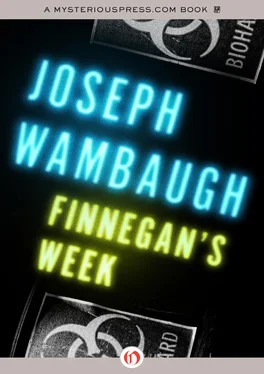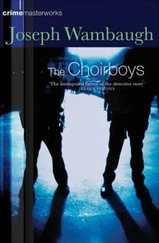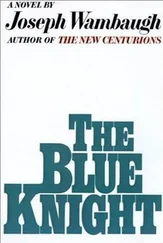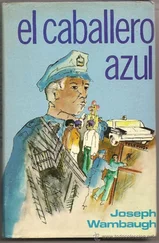Joseph Wambaugh - Finnegan's week
Здесь есть возможность читать онлайн «Joseph Wambaugh - Finnegan's week» весь текст электронной книги совершенно бесплатно (целиком полную версию без сокращений). В некоторых случаях можно слушать аудио, скачать через торрент в формате fb2 и присутствует краткое содержание. Жанр: Полицейский детектив, на английском языке. Описание произведения, (предисловие) а так же отзывы посетителей доступны на портале библиотеки ЛибКат.
- Название:Finnegan's week
- Автор:
- Жанр:
- Год:неизвестен
- ISBN:нет данных
- Рейтинг книги:3 / 5. Голосов: 1
-
Избранное:Добавить в избранное
- Отзывы:
-
Ваша оценка:
- 60
- 1
- 2
- 3
- 4
- 5
Finnegan's week: краткое содержание, описание и аннотация
Предлагаем к чтению аннотацию, описание, краткое содержание или предисловие (зависит от того, что написал сам автор книги «Finnegan's week»). Если вы не нашли необходимую информацию о книге — напишите в комментариях, мы постараемся отыскать её.
Finnegan's week — читать онлайн бесплатно полную книгу (весь текст) целиком
Ниже представлен текст книги, разбитый по страницам. Система сохранения места последней прочитанной страницы, позволяет с удобством читать онлайн бесплатно книгу «Finnegan's week», без необходимости каждый раз заново искать на чём Вы остановились. Поставьте закладку, и сможете в любой момент перейти на страницу, на которой закончили чтение.
Интервал:
Закладка:
Her civilian colleagues were okay guys, but they were civilians, and much older. They didn’t bring the same enthusiasm that a young military investigator brought to the job, and no wonder-they made about $1,000 less a month than their counterparts at nearby San Diego Police Department. In fact, when they factored in Bobbie’s pay and her military fringe benefits, she cost the navy twenty-five thousand a year more than her civilian colleagues did.
Civilian investigators tended to stay on the job a long time except for one who’d recently resigned to take a position with a police department in northern California. He was the one who took a look at Bobbie Ann Doggett and said in a stage whisper to a senior chief petty officer: “Bad Dog, my ass. Five foot three in platforms. It’s what the navy’s come to: runts ’n cunts!”
On the evening he’d said goodbye, Bobbie promised him she’d only sniffle, and try not to grieve hysterically when she saw his taillights disappear. The pissant!
Bobbie sometimes toyed with the fantasy of retiring from the navy after twenty years and then joining the San Diego P.D. She’d be only thirty-eight years old, still young enough to do police work. But that was almost eleven years away. Right now, Bobbie was doing a job she loved, and she wanted to do it for the full three-year tour and maybe even get an extension. Sea duty she did not love.
When Fin Finnegan was busy learning that tomorrow is another day, Bobbie Ann Doggett had already settled back into the office routine. The investigators and all other security personnel worked out of one-story wood-frame buildings just inside the main gate, buildings that had served as the base hospital in the 1920’s, as evidenced by the extra-wide doorways.
Both of her colleagues said they were glad to see Bobbie back, but that it was mildly depressing to have someone so happy and cheerful around the office again. They asked her if Kenosha had changed much. And did the kids still go to school with animal traps in their book bags. And did they have credit cards by now or did they still trade in pelts. The female civilians gave her a welcoming hug with no wisecracks.
Bobbie especially liked the oldest investigator, Reggie Cole, who claimed he’d been at North Island since aids were admiral’s helpers, but the guy smoked more than Kuwait in the war. During the lunch hour, Bobbie told Reggie she was going to mosey over to the post office to buy some stamps, but really, she wanted to get some fresh air. Even though he’d taken to smoking outside at the insistence of everyone, Reggie reeked like an ashtray. It was in his hair and in his pores.
She had to hike up her skirt to mount the bike, and three sailors in civvies made the usual sounds of adolescent angst that teenagers make when they see the exposed thigh of an older woman. Bobbie looked at them and considered that in little more than two years she’d be thirty . Those sailors were children.
Bobbie decided to ride along the quay and sniff the ocean breeze blowing in from the sea on that warm October day. She thought that San Diego had America’s most beautiful big-city harbor, maybe one of the world’s most beautiful big-city harbors. It was incredibly clean, and the postmodern architecture looked acceptable in the slanting autumn light. Geometric glass buildings-hexes, octagons, emerald shapes-dominated the skyline. Bobbie didn’t like smoked and mirrored windows, and there was a lot of that.
In fact, she didn’t like much of the new architectural experiments. Horton Plaza, where she often shopped, was a multicolored set of mammoth Lego toys with a dizzying maze of walkways. She thought the upper level should post suicide-prevention signs for trapped patrons. Bobbie figured that San Diego must be a haven for architects who flunked drafting in their freshman year.
But the fortuitous geography of her adopted city defied the modern architects’ efforts. Short of employing nuclear devices, nobody could compromise the site of San Diego, with its promontories, and the glorious harbor sparkling and glittering at twilight when the sun was setting beyond Point Loma.
Bobbie’s favorite time was twilight when the city view softened the geometry of the modern skyline and made the buildings glow in hues ranging from rose to burnt sienna. Even the sandstone color of the air station was warmed by that light, and the naval base then reminded Bobbie of an old California mission.
Bobbie was interested in nuclear-powered attack submarines, and several times had visited the sub base in the lee of Point Loma, even going aboard one of the huge boats that carried well over a hundred people. And when she was there she always visited the Cabrillo National Monument named for the Portuguese who discovered San Diego Harbor in the sixteenth century. From Point Loma, she could look south and see all of the twelve-mile harbor, and maybe take a tour through the old lighthouse.
That was the kind of San Diego architecture that Bobbie loved, the nineteenth-century lighthouse on top of the point, and the newer one down at the water’s edge, still operated by the U.S. Coast Guard. She thought it would be interesting to be stationed out there and watch the migration of California gray whales. Certainly it’d be better than a tour of sea duty.
And Bobbie Ann Doggett loved the lighthouse because during the wars of the twentieth century it had represented the last look at their country for thousands of American sailors. The final look that some would ever have.
Now that she was back Bobbie had to make some short-term plans. First, she’d begin a rigorous aerobics program at the women’s fitness center. Maybe she’d start swimming laps, anything to get rid of the disgusting blubber that delighted her mom. The thought made her pedal more vigorously.
While cruising along the quay, Bobbie saw that there were a large number of tractor-trailers and smaller vans loading and unloading at the monster warehouses, buildings huge enough to receive the contents of ships. She noticed an AOE docked at the quay wall. The big oiler had picked up two H-46 helicopters at Johnston Atoll, the U.S. possession just south of the Hawaiian chain. The choppers were in the process of being unloaded by crane, and they looked like huge larvae in white cocoons of rubberized plastic.
The ship had some other cargo that the skipper had picked up on Johnston Island in what the supply people called an “opportunistic lift.” The “lift” consisted of drums with special flanged ring seals, the flange being constructed so that it could easily be handled by robot arms. Inside the big drums were smaller drums, vacuum-sealed like giant cans of peanuts. On each outer drum was a packing list and a port through which one could look to see the packing surrounding the inner peanut cans. The packing contained granules that would, with a change in color, inform the viewer of a toxic leak inside. At that point the outer drum would be gingerly handled and not opened except in a clean and protected environment. Some of the less hazardous waste such as two drums of contaminated fuel mixtures had been dollied into the warehouse to await the civilian contractor who would haul it away.
As Bobbie Ann Doggett bicycled, fretting about being ten pounds past bikini-secure, a navy bosun was bitching to another that there was nobody there to take control of all the waste they’d off-loaded.
The older bosun said, “The navy only knows how to make chemicals, not get rid a them. And there’s never a civilian contractor comes when they’re supposed to. You think a civilian contractor gives a shit?”
“If they want the goddamn navy contract they should give a shit,” said the younger one.
“Scope those bazooms!” the older bosun said, as Bobbie cycled past. “Where’s she work?”
Читать дальшеИнтервал:
Закладка:
Похожие книги на «Finnegan's week»
Представляем Вашему вниманию похожие книги на «Finnegan's week» списком для выбора. Мы отобрали схожую по названию и смыслу литературу в надежде предоставить читателям больше вариантов отыскать новые, интересные, ещё непрочитанные произведения.
Обсуждение, отзывы о книге «Finnegan's week» и просто собственные мнения читателей. Оставьте ваши комментарии, напишите, что Вы думаете о произведении, его смысле или главных героях. Укажите что конкретно понравилось, а что нет, и почему Вы так считаете.












